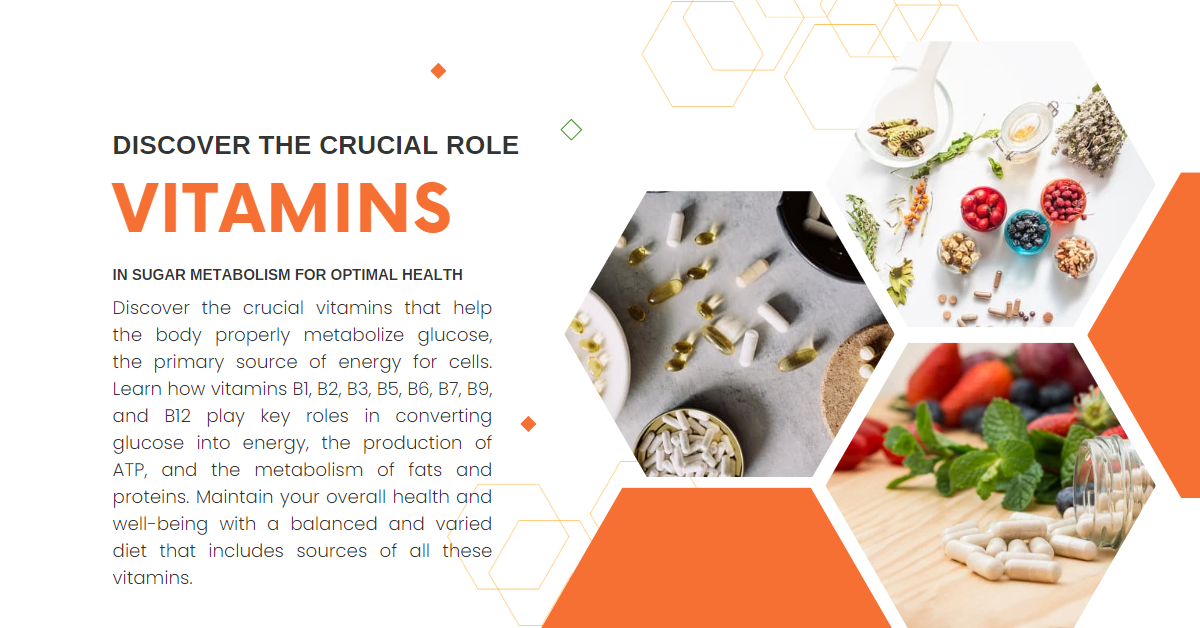Vitamins play a critical role in the metabolism of sugar (glucose). Glucose is the primary source of energy for the body’s cells, and the body’s ability to properly metabolize glucose is crucial for maintaining overall health and well-being.
There are several vitamins that are involved in the metabolism of sugar, including:
- Vitamin B1 (thiamine): Thiamine is necessary for the conversion of glucose into energy. It helps in the production of ATP, a molecule that provides energy to the cells. A deficiency of thiamine can lead to a condition called beriberi, which is characterized by weakness, fatigue, and nerve damage.
- Vitamin B2 (riboflavin): Riboflavin is involved in the production of ATP, the molecule that provides energy to the cells. It also helps in the metabolism of fats, which can be used as an alternative energy source to glucose.
- Vitamin B3 (niacin): Niacin is involved in the production of ATP, and it helps in the breakdown of glucose for energy production. It also plays a role in the metabolism of fats and proteins.
- Vitamin B5 (pantothenic acid): Pantothenic acid is necessary for the metabolism of carbohydrates, fats, and proteins. It helps in the production of ATP and is involved in the formation of coenzyme A, which is necessary for the breakdown of glucose.
- Vitamin B6 (pyridoxine): Pyridoxine is involved in the metabolism of carbohydrates, fats, and proteins. It helps in the production of ATP and is necessary for the breakdown of glycogen, a storage form of glucose.
- Vitamin B7 (biotin): Biotin is necessary for the metabolism of carbohydrates, fats, and proteins. It helps in the breakdown of glucose and the production of ATP.
- Vitamin B9 (folic acid): Folic acid is involved in the production of red blood cells and is necessary for the metabolism of amino acids, which are the building blocks of proteins.
- Vitamin B12 (cobalamin): Cobalamin is necessary for the metabolism of carbohydrates, fats, and proteins. It helps in the production of ATP and is involved in the formation of red blood cells.
In summary, vitamins play a crucial role in the metabolism of sugar. They help the body convert glucose into energy, and they are also involved in the metabolism of fats and proteins. A balanced and varied diet that includes sources of all these vitamins can help ensure proper glucose metabolism and overall health
References
- Office of Dietary Supplements. (2021). Thiamin. National Institutes of Health. https://ods.od.nih.gov/
factsheets/Thiamin- HealthProfessional/ - Office of Dietary Supplements. (2021). Riboflavin. National Institutes of Health. https://ods.od.nih.gov/
factsheets/Riboflavin- HealthProfessional/ - Office of Dietary Supplements. (2021). Niacin. National Institutes of Health. https://ods.od.nih.gov/
factsheets/Niacin- HealthProfessional/ - Office of Dietary Supplements. (2021). Pantothenic Acid. National Institutes of Health. https://ods.od.nih.gov/
factsheets/PantothenicAcid- HealthProfessional/ - Office of Dietary Supplements. (2021). Vitamin B6. National Institutes of Health. https://ods.od.nih.gov/
factsheets/VitaminB6- HealthProfessional/ - Office of Dietary Supplements. (2021). Biotin. National Institutes of Health. https://ods.od.nih.gov/
factsheets/Biotin- HealthProfessional/ - Office of Dietary Supplements. (2021). Folate. National Institutes of Health. https://ods.od.nih.gov/
factsheets/Folate- HealthProfessional/ - Office of Dietary Supplements. (2021). Vitamin B12. National Institutes of Health. https://ods.od.nih.gov/
factsheets/VitaminB12- HealthProfessional/







